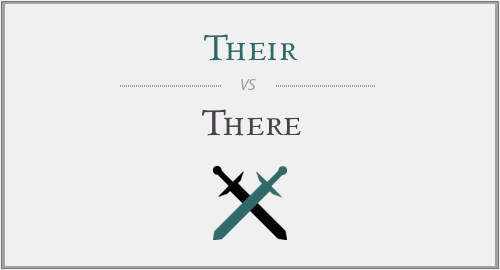Their vs. There
The quick answer is no! They don’t mean the same thing. They may sound similar and they may have similar spellings, yet “their” and “there” have nothing in common in regard to their definitions.
In fact, “their'' and “there” are two different words, and not only do they have completely different meanings and uses in sentences, they also fall into different grammatical categories. One is a pronoun, whereas the other is an adverb. To see all the meanings of each, as well as their grammatical functions, check the two dedicated sections below, where you will be able to find some great illustrative examples.
When do we use “their”?
“Their” is a pronoun, mainly used as a determiner. More exactly, it is used to show belonging or relating to a certain group (of people or animate beings). The same word can also be used for something that belongs or relates to a particular person, when using “his” or “her” might be inappropriate, or irrelevant.
Example 1: Our friends and their children will join us for dinner tonight. – “their” is a pronoun used to show belonging or relation to a certain group of people.
Example 2: Did that person give you their name or their phone number? – “their” may also be preferred in order to avoid using “his” or “her” when referring to something belonging or relating to a particular person.
When do we use “there”?
While “their” is a seemingly simple word, with two distinct uses and a clear meaning, “there” is a little bit more complex, in regard to the contexts where it may appear. To be clear, “there” is mainly used as an adverb, expressing a location or a particular place.
But it can also be used when indicating direction, when pointing or referring towards something in order to bring another’s attention to it; or when referring to something available or present. Sometimes, “there” may also be used when referring to a certain point or time during an activity or a process.

Further, besides functioning as an adverb, “there” may function as a pronoun in certain contexts. More specifically, in a particular expression. In this case, “there” is used to show that something exists, or something is happening. You’ll definitely get a better understanding of all these explanations by reading the examples below:
Example 1: They moved to London because their son decided to settle there. – “there” is mainly used as an adverb, referring to a particular place/location.
Example 2: Put the flowers in the vase on that table over there. – the same adverb “there” can also be used to indicate a certain direction in order to make someone else look towards it.
Example 3: The money is there for you whenever you need it. – “there” can be used to show availability or presence of something.
Example 4: If you feel tired during the game, stop there and don’t go for a next round. – here, “there” refers to a certain point during an activity.
Example 5: There are two shopping malls in this city. – “there” can also be used as a pronoun, showing that something exists.
Conclusion
To sum this all up, although they sound almost perfectly identical, “their” and “there” are not synonyms and have nothing in common as to their meanings.
Keep in mind that “their” is always a pronoun expressing belonging or relating to a particular group or person, whereas “there” can be used both as an adverb expressing location/direction/availability and as a pronoun showing that something exists. Now give yourself a pat on the back for making it through this article!




Have a discussion about this article with the community:
Report Comment
We're doing our best to make sure our content is useful, accurate and safe.
If by any chance you spot an inappropriate comment while navigating through our website please use this form to let us know, and we'll take care of it shortly.
Attachment
You need to be logged in to favorite.
Log In